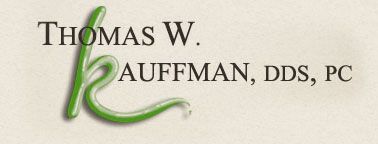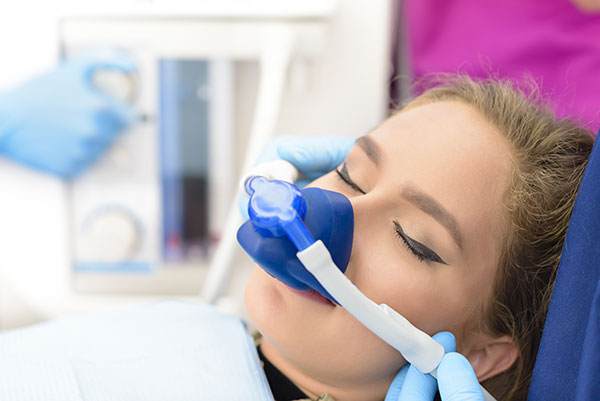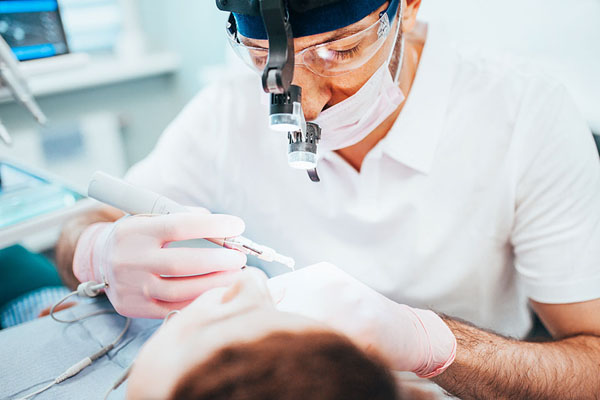Sedation Dentistry in Atlanta, GA
Sedation Dentistry Offers Relief for Dental Anxiety
Routine dental care is crucial to maintaining a healthy and confident smile. However, nearly half of the US adult population experiences true dental fear or dental phobia, often stemming from past bad experiences. For many, the thought of undergoing dental procedures can trigger anxiety and apprehension. These situations are where sedation dentistry comes to the rescue. By offering a relaxed and comfortable experience, sedation dentistry has revolutionized how people perceive dental treatment.
At Thomas W. Kauffman, DDS, PC, we offer sedation dentistry for your benefit. To schedule an appointment with our Atlanta dentist, contact us today by calling (404) 524-1981.
What Is Sedation Dentistry?
Sedation dentistry, also known as sleep dentistry, involves the use of medications to help patients relax and remain calm during dental procedures. It’s often used for patients who experience anxiety, fear, or discomfort when visiting the dentist or for those undergoing lengthy or complex dental treatments.
There are different levels of sedation used in dentistry, and the choice of sedation method depends on the patient’s level of anxiety and the nature of the dental procedure. For moderate sedation, oral sedation dentistry is an option, involving a tiny pill that induces a twilight sedated state, allowing patients to undergo multiple procedures at once without being fully aware. They wake up back home and comfortable after the procedures.
For deep sedation, IV sedation dentistry is the deepest form available in a dental office setting. It involves delivering sedative medications directly to the bloodstream through an IV line, allowing the dentist to monitor and adjust the patient’s sedated state as necessary. Most people who receive IV sedation dentistry fall asleep and have little to no memory of their treatment when they wake up.
How Does Sedation Dentistry Work?
Sedation dentistry has various types of dental sedation to accommodate different patient needs. The three primary levels of sedation are:
- Minimal Sedation: This level of sedation keeps you awake but relaxed. It’s often achieved using nitrous oxide, also known as “laughing gas.” The dentist controls the amount of gas you receive, ensuring you remain comfortable throughout the procedure.
- Moderate Sedation: With moderate sedation, you may not remember much of the procedure. This level of sedation is usually achieved through an oral sedative taken before the procedure.
- Deep Sedation: While not fully unconscious, you’ll be on the edge of consciousness during deep sedation. It’s commonly administered through intravenous (IV) medications, providing profound relaxation.
To enhance patient comfort and safety, the use of local anesthesia is often combined with these sedative drugs during procedures.
Types of Sedation Dentistry
Nitrous Oxide
Nitrous oxide, also known as laughing gas, is a commonly used sedative that induces a state of relaxation. Administered through a mask over the nose, nitrous oxide allows you to remain awake while feeling at ease. It’s an excellent option for those with mild anxiety or who need a quick recovery after the procedure.
IV Sedation
IV sedation delivers medication directly into your bloodstream, inducing a deep state of relaxation. While you won’t be fully unconscious, you might not remember the procedure afterward. IV sedation is ideal for more complex treatments and patients with significant dental phobias. Reviewing a patient’s medical history is crucial before proceeding with IV sedation to ensure the safety and predictability of the treatment.
Oral Conscious Sedation
Oral sedation is taken in pill form before the procedure, offering a higher level of relaxation than nitrous oxide. While you’re awake, you might feel drowsy and less aware. Oral sedation is particularly useful for patients with moderate anxiety or long procedures.
General Anesthesia
Reserved for extensive procedures or cases where patients must be completely unconscious, general anesthesia ensures you’re asleep. An anesthesiologist administers the medication and closely monitors your vital signs. This type of sedation is typically for oral surgeries or lengthy treatments.
Local Anesthetic
While not a form of sedation, local anesthetic has many pain-relieving effects. It involves injecting numbing medication into the treatment area, ensuring you don’t feel pain during the procedure. Local anesthetists are often combined with minimal or moderate sedation for a comprehensive comfort experience.
Benefits of Sedation Dentistry
Sedation dentistry offers a range of benefits that make it an attractive option for many patients:
- Anxiety Relief: Dental anxiety is a real concern, often preventing individuals from seeking necessary treatments. Sedation dentistry alleviates this anxiety, making dental visits more manageable.
- Pain Management: Sedation can also include pain-relief properties, ensuring minimal discomfort during and after the procedure.
- Time Efficiency: Since patients are more relaxed, dentists can perform complex procedures more efficiently, reducing the appointments required.
- No Memory: For those with dental phobias, having little to no memory of the procedure can be a significant relief.
- Gag Reflex Control: Some individuals have an overly sensitive gag reflex, making dental procedures challenging. Sedation helps control this reflex, easing the process.
Candidacy For Sedation Dentistry
While sedation dentistry can benefit many, it might work in certain cases. People who fall into the following categories might not be good candidates for sedation dentistry:
- Allergic Reactions: Individuals with a history of severe allergic reactions to sedative medications or any components used in the sedation process should avoid sedation dentistry.
- Certain Medical Conditions: Patients with certain medical conditions, such as severe respiratory issues (like untreated sleep apnea), heart problems, or uncontrolled high blood pressure, may not be suitable for sedation due to potential risks.
- Pregnant Women: Pregnant women are generally advised to avoid sedation dentistry, especially during the first trimester, as the effects of sedative medications on the developing fetus aren’t well understood.
- Drug Interactions: People taking certain medications, particularly those that can interact with sedatives, should consult with their healthcare provider before undergoing sedation dentistry.
Dental Sedation Monitoring and Safety
No matter the type of sedation used, patient safety is paramount. Dental professionals closely monitor vital signs and adjust the sedation levels to ensure your well-being throughout the procedure.
Incorporating various types of sedation into dental practice allows for a truly patient-centric approach. Whether you have mild anxiety or require extensive treatment, sedation dentistry offers a solution to ensure your dental experience is as comfortable and stress-free as possible.
Sedation Dentistry Costs
The cost of sedation dentistry can vary widely depending on several factors, including the type of sedation used, the geographic location of the dental practice, the complexity of the dental procedure, and the dentist’s or oral surgeon’s fees. On average, the costs of sedation dentistry range from $25 to $1,500 or more.
Frequently Asked Questions
Can anyone get sedation dentistry?
Sedation works for most patients, but your dentist will evaluate your health to determine the best approach. It’s especially beneficial for those with anxiety, a strong gag reflex, or extensive treatment needs.
Will I be unconscious with sedation dentistry?
Not necessarily. Minimal and moderate sedation keep you conscious, while deep sedation might cause you to drift in and out of consciousness.
Alleviate Dental Anxiety With Sedation Dentistry
Sedation dentistry has opened the doors to a more relaxed and enjoyable dental experience for countless patients. By offering various levels of sedation, this approach ensures that dental anxiety no longer stands in the way of maintaining optimal oral health. If the thought of dental procedures has kept you from seeking treatment, consider discussing sedation dentistry.
To schedule an appointment with our dentist in Atlanta, contact us today by calling (404) 524-1981.


